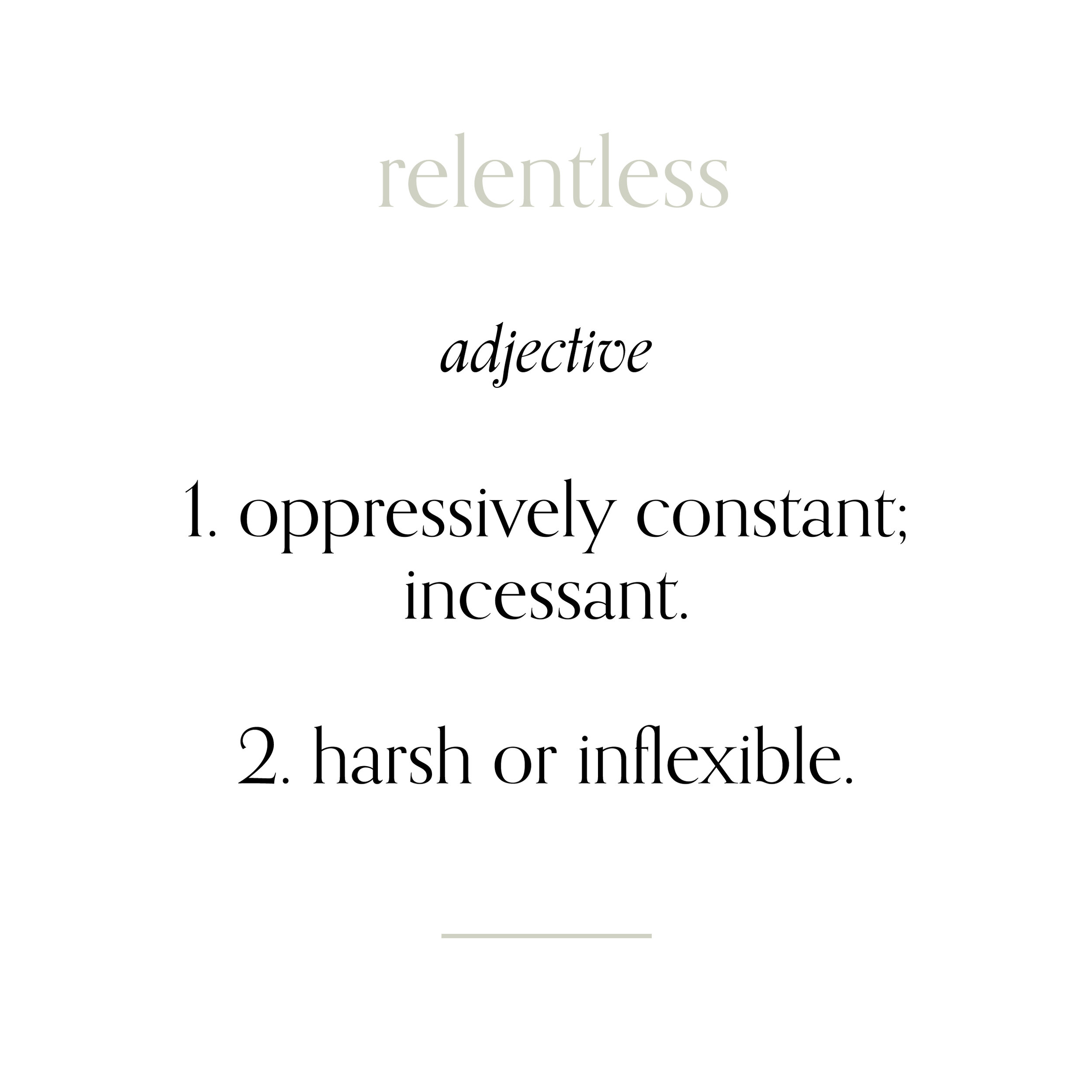Don’t Be Swindled by Relentlessness
I have been in corporate environments and witnessed many corporate cultures where the word “relentless” is thrown around like a gold medal everyone wants to wear around their neck. Behavior that not only went above and beyond what was necessary but showed extreme personal sacrifice was heralded as the kind of effort all team members should exhibit. Unfortunately, the perfectionist and high-performer in me saw this as a bar I had to not only reach but to exceed. This meant I only contributed to the dysfunctional cultures and forced other colleagues to also try to measure up. Many “successful” cultures verified this way of thinking and motivating that it created enough confirmation bias to encourage the fact that being “relentless” was the way to win and be the greatest version of myself.
This perpetual cycle always rubbed me wrong deep down, but my insecurity that pushed me to beat an expectation of someone else (or even myself) was too strong to ignore, until I came to the other side of understanding the truth of value and corporate wellness. I believe if a company is ever going to grow up and survive where the younger generations are headed, it will have to learn that relentlessness is a sign of immature and insecure business leadership.
THE SWINDLE OF THE HUSTLE CULTURE
The culture of toil glamour, performance workaholism, and hustle is a swindle. It has been branded and marketed by those at the top who are the only people who largely benefit from relentless employees. As long as some rewards are witnessed for personal sacrifice, many will believe it pays off.
Even though data reveals that long hours do nothing to serve productivity or creativity, rare case studies of the “pay off” continue to justify the hustle culture because it continues to pad the pockets of a few elites. The founder of Basecamp, Mr. Heinemeier Hansson, said “It’s grim and exploitative.” He also cited that millennial workers would eventually revolt against the culture of overwork. “People aren’t going to stand for this,” he said, using an expletive, “or buy the propaganda that eternal bliss lies at monitoring your own bathroom breaks.” He was referring to an interview by Marissa Mayer, former CEO of Yahoo, which outlined that working 130 hours a week was possible “if you’re strategic about when you sleep, when you shower, and how often you go to the bathroom.” (Source)
Elon Musk tweeted that “nobody ever changed the world on 40 hours a week.” The correct number of hours “varies per person", but is “about 80 sustained, peaking about 100 at times. Pain level increases exponentially above 80.”
This assumes that the only value of people is their productivity rather than their humanity.
HOW DID WE GET HERE?
The HBO satire “Silicon Valley” used the mission statement “making the world a better place”. This marketing has become the voice of many companies who connect the virtues of work with “mission" messaging. It has become the standard to ensure business is not just for the bottom line but to serve humanity in some capacity. The authenticity and sincerity of this is in question when relentlessness is used as a descriptor for work ethic. The very definition suggests analyzing the others at the starting line and having a plan in place to pounce on them and leave them for dead in the race.
With the rise of technology companies, it became normal for companies to offer perks in order to become the source of life for their employees. Who asked companies to take care of 360 degrees of employees' lives? When did people sign up for laundry services, child care, cafes, catered meals, resting lounges and every other perk meant to keep them at the office? Does this actually attract the best talent or simply keep people at the office? To my knowledge, top talent doesn’t have a prerequisite that they would like their entire lives to exist at the office in order to do their best work. This is a fabricated marketing tactic to serve business.
With wage growth nonexistent, the relentlessness propaganda should have no appeal, so why is it so prominent? “Work” has found its way into an idol position. As people search for meaning, companies are providing everything possible to fill the void and act as though the work itself is meaning. It is cultist, where the leaders act as though they are not the ones to worship even though they remain in a position of “high priest”, but the work itself should be the actual god (lower case ‘g’).
As this culture continues to fester, colleagues compete with one another, and soon the behavior is so normal it is accepted. Confirmation bias in what seems to be “successful” startups or corporate cultures continue to perpetuate the disease.
WHAT IS THE COST?
Since work has been positioned as the purpose for living, anything that steals time from work creates a sense of guilt; so much so that what ends up on the chopping block are HUMAN relationships. Friends, family, spouses and children are the ones who get put aside in the name of “mission, purpose, meaning and a long term destination.” Every book selected, minuscule time watching television, browsing the internet, etc. must reflect dedication to the idol of work or you have lost your connection and dedication to your entire purpose for your life. If there isn’t a ROI for the time spent, you’ve wasted your own life.
In this mindset, one may find themselves actually contemplating "Did spending time with my spouse or baby help me push the mission forward?” This is sad and deluded, but it is happening. The only thing that could make this corporate cult mentality worse is to also throw religion or service to God in the mix, which also happens, but that’s a whole other level of manipulation that gets into much deeper places.
NEGATIVE FOR PEOPLE AND BUSINESS
Numerous studies have found that overwork can lead to all sorts of health problems: impaired sleep, depression, heavy drinking, diabetes, impaired memory, and heart disease. Obviously these are most harmful to the employees experiencing them, but these also damage a company’s bottom line through absenteeism, turnover, and rising health insurance costs. This corporate culture may have swindled millennials to date, but I believe it won’t continue to work as the world recovers from the coronavirus pandemic and embraces the characteristics of Gen Z.
For people, the end of the hustle will come in the form of burnout, disease, ruined marriage, damaged children, lost friendships, and no interests or talents to speak of outside of your work. The black hole created by work will suck up everything that you once were and you will have to spend a lot of time dealing with PTSD while trying to find your identity as a human again.
WHAT TO DO
Ask yourself if the mission of your company is truly moving you or the human race forward in any measurable capacity. If this is speaking to you, analyze the designers of the corporate culture in which you work and see where the benefits truly lie. What have the costs in your life actually been? If the costs have been human relationships, consider whether the mission you’ve sold your life for is actually a mission worth serving. Be sure that the mission and purpose that your company is selling is also happening within its own culture. If a company is going to “save the world,” it is quite hypocritical for it to do so at the cost of the very lives that are building it. Perhaps what you’re searching for is not in your work at all. Perhaps it’s time to allow work to serve a purpose that is fitting for the actual product or service offered.
Finally, be conscious enough to understand that your life is not just for you. It is your responsibility to utilize your gifts to serve the relationships immediately around you in love and in action. It is not possible to truly love others when you’re running on empty all of the time. You need to be responsible with the body that you’ve been given, and that takes attention to health and wellness. No one can be well-rounded and healthy if they’re spending their entire life on a work deadline.
“The meaning of life is to find your gift. The purpose of life is to give it away.” Pablo Picasso
If the purpose of life is to give it away, consider the recipient carefully. A company is just a portal to serve people. It cannot replace them. The only destination we have been given for certain is this very moment - don’t squander it away for a fake medal in a corrupt system.
Sources:
https://www.vox.com/2015/8/17/9164339/amazons-work-culture
https://www.nytimes.com/2019/01/26/business/against-hustle-culture-rise-and-grind-tgim.html
https://hbr.org/2015/08/the-research-is-clear-long-hours-backfire-for-people-and-for-companies
https://hbr.org/2009/10/dont-overwork-your-brain
https://hbr.org/2015/04/working-long-hours-makes-us-drink-more






